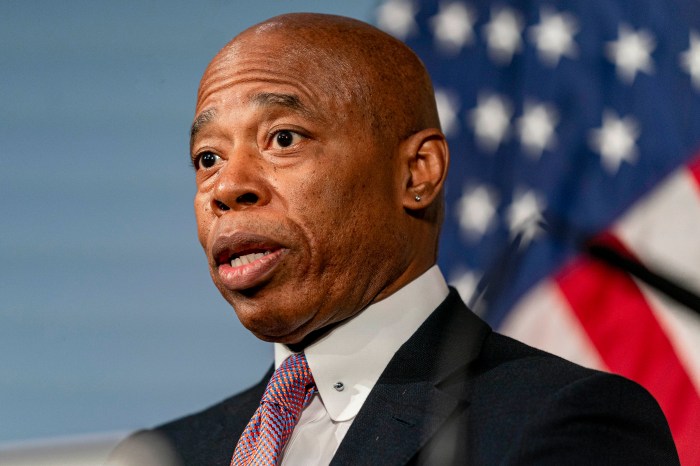Bill Frist, Republican Senate Leader, pledges federal marriage amendment vote in June
Conservative lawmakers are gearing up for a vote on the Marriage Protection Amendment (MPA) in the U.S. Senate this year, an attempt to gain political advantage just before the November elections, according to gay rights groups and allies.
The MPA would alter the federal Constitution to ban any state or municipality from giving legal recognition to same-sex marriages and could conceivably be interpreted to bar any government from creating civil unions or domestic partnerships as well.
Under current U.S. law, the Defense of Marriage Act (DOMA) ensures that no state is required to recognize same-sex marriages performed in other states. Many legal scholars, both liberal and conservative, believe DOMA would not survive a challenge in the U.S. Supreme Court because of the requirements that states afford full faith and credit to contracts entered into in sister states. Fear among conservatives that DOMA could one day be overturned is a key reason why the amendment route has won support.
Last week, the conservative American Family Association first announced on its Web site that the full Senate would vote on the amendment in March. The group was apparently acting on inside information, because as of that time the Republican Senate leadership had not made any specific announcements regarding the legislation, nor had it completed the committee approval process. But on Friday, Senate Majority Leader Bill Frist, a Tennessee Republican, announced at the Conservative Political Action Committee Conference in Washington that he would bring the amendment before the Senate on June 5.
“Today the institution of marriage is under attack,” Frist told the assembled crowd. “And on June 5—and everybody note that on your calendar—when I bring the Marriage Protection Amendment to the Senate floor, we will act.”
Speakers at the conference included Senators Rick Santorum and Sam Brownback, Republicans from Pennsylvania and Kansas, respectively, who are noted marriage amendment supporters, as well as Alan Chambers, leader of Exodus International, an “ex-gay” organization.
Senator Charles Schumer, a New York Democrat, denounced Frist’s statement at a Human Rights Campaign dinner in Manhattan on Saturday.
“I want to tell Bill Frist something. Two years ago, I promised you that we would get a majority against that evil piece of legislation that was motivated by anger and hatred…and I pledge to get even more votes against it this year,” Schumer said.
The full text of the Marriage Protection Amendment reads, “Marriage in the United States shall consist only of the union of a man and a woman. Neither this Constitution, nor the constitution of any State, shall be construed to require that marriage or the legal incidents thereof be conferred upon any union other than the union of a man and a woman.”
The main sponsor is Senator Wayne Allard, a Colorado Republican.
In 2004, the Senate failed to end debate on the amendment so it could come up for a vote, effectively killing the measure. The vote against ending debate was 50-48, suggesting that the measure lacked even majority support, much less the two-thirds needed to advance amendments to state legislatures for ratification (by three quarters of the 50). That time, the amendment was brought before the Senate without first undergoing the traditional committee vetting process.
The same year, the House also failed to approve the amendment.
In 2004, some conservative senators objected to the proposed amendment’s second sentence, claiming it was too draconian. John Warner, the Virginia Republican who chairs the influential Armed Services Committee, said he would vote against the amendment because he believed it would ban civil unions and domestic partnership arrangements.
A proposal by the amendment’s sponsors to remove the second sentence and make it more palatable to key senators was rejected as too sudden a change in such an important matter. Senate watchers noted that these kinds of differences are usually hashed out in committee, rather than on the floor.
Late last year a vote along party lines in the Senate’s Judiciary Subcommittee on the Constitution advanced the amendment. Arlen Specter, a Pennsylvania Republican, and chairman of the Judiciary Committee as a whole stated at the meeting that even though he opposed the measure he would vote to get it out of committee for a full Senate vote.
“However, I do not think it appropriate at this time to have a constitutional amendment,” Specter said.
However, because the Judiciary Committee has been occupied with the confirmation of Supreme Court Justice Samuel Alito and asbestos lawsuit reform, Specter has not held hearings on the MPA since the subcommittee’s approval.
Angela de Rocha, a spokeswoman for Allard, said the senator was not concerned this time that the amendment might come before the entire body before passing out of the Judiciary Committee.
“There have been several subcommittee hearings,” de Rocha said. “The amendment has been well debated and is ready to be voted on in the Senate.”
Frist’s promise of the June 5 date has many calling the timing a ploy for votes.
“The ground has not shifted on this,” said Chris Labonte, legislative director of the Human Rights Campaign. “Frist and others have acknowledged they don’t have the votes to pass the Marriage Protection Amendment.”
Labonte noted that June is just in time for the Republicans to use gay marriage in their campaigns for the November elections. Just as in 2004, Republicans are hoping the issue generates a high turnout by conservative voters, he said.
“Because they don’t have the support for passage, the timing of this vote certainly suggests it is politically motivated,” Labonte said.
Frist recently announced he will not seek re-election, but it is expected he will run for the U.S. presidency in 2008.
Frist’s office did not return calls for comment.
gaycitynews.com

































